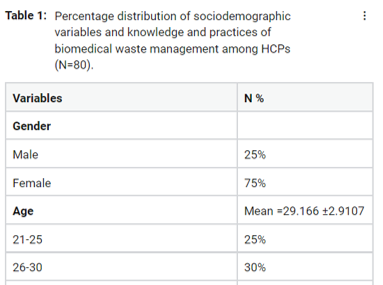Abstract
This study was conducted to ascertain the knowledge and practices related to biomedical waste management in secondary care hospitals in our region. The required information was obtained using a simple questionnaire which included 2 parts, namely, knowledge and practices with 16 and 20 questions respectively. Out of the 80 respondents, 75 % were females. Nurses constituted a major fraction of healthcare professionals (70%) in hospitals. About 47.5% of the respondents had a working experience of 0-5 years. Females had better knowledge and practices in the disposal of medical wastes (91.14% and 94.998%) as compared to males (88.125% and 89%). There was a significant association of age with the knowledge (p= 0.013) and insignificant regarding practice (p= 0.998) of healthcare professionals. The knowledge and practices of all healthcare professionals were overall good. There was a significant association between a professional category of healthcare professionals with knowledge (p= 0.00000181) and practices (p= 0.003129) of medical waste disposal. The results of the investigation uncovered that healthcare professionals had great learning about the disposal of biomedical waste. It was additionally discovered that healthcare professionals adhered to the strategies and the rules related to biomedical waste management.
Full text article
References
Bashaar, M., Thawani, V., Hassali, M. A., Saleem, F. 2017. Disposal practices of unused and expired pharmaceuticals among general public in Kabul. BMC Public Health, 17(1):45–45.
Bhayana, K., Rehan, H., Arora, T. 2016. Comparison of the knowledge, attitude, and practices of doctors, nurses, and pharmacists regarding the use of expired and disposal of unused medicines in Delhi. Indian Journal of Pharmacology, 48(6).
Biomedical Waste (Management & Handling) Rules 1998. In Extraordinary, Part II, Section 3, Subsection (ii), The Gazette of India . volume 3, pages 460–460. Extraordinary, Part II.
Bokhoree, C., Beeharry, Y., Makoondlall-Chadee, T., Doobah, T., Soomary, N. 2014. Assessment of Environmental and Health Risks Associated with the Management of Medical Waste in Mauritius. APCBEE Procedia, 9:36–41.
Ferdowsi, A., Ferdosi, M., Mehrani, M. 2010. Incineration or Autoclave? A Comparative Study in Isfahan Hospitals Waste Management System. 25.
Hamajima, N. 2014. Evaluation of Knowledge, Practices, and Possible Barriers among Healthcare Providers regarding Medical Waste Management in Dhaka. Bangladesh. Medical Science Monitor, 20:2590–2597.
Kapoor, D., Nirola, A., Kapoor, V., Gambhir, R. S. 2014. Knowledge and awareness regarding biomedical waste management in dental teaching institutions in India- A systematic review. Journal of Clinical and Experimental Dentistry, 6(4):419–424.
Kishore, J., Agarwal, R., Kohli, C., Sharma, P. K., Kamat, N., Tyagi, S. 2014. Status of biomedical waste management in nursing homes of delhi. India. Journal of Clinical and Diagnostic Research : JCDR, 8(3):56–58.
Makhura, R. R., Matlala, S. F., Kekana, M. P. 2016. Medical waste disposal at a hospital in Mpumalanga Province, South Africa: Implications for training of healthcare professionals. South African Medical Journal, 106(11):1096–1096.
Mathur, P., Patan, S., Shobhawat, A. S. 2012. Need of Biomedical Waste Management System in Hospitals - An Emerging issue - A Review. Current World Environment, 7(1):117–124.
Omar, D., Nazli, S. N., Karuppannan, S. A. 2012. Clinical Waste Management in District Hospitals of Tumpat. Procedia Social and Behavioral Sciences, 68:134–145.
Rajput, R., Prasad, G., Chopra, A. K. 2009. Scenario of solid waste management in present Indian context. Caspian Journal of Environmental Sciences, 7(1):45–53.
Authors

This work is licensed under a Creative Commons Attribution-NonCommercial-NoDerivatives 4.0 International License.

